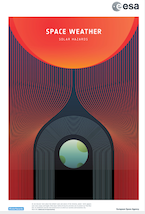Speaker
Description
Space weather is defined by the conditions on the Sun, the interplanetary space and Earths atmosphere. A change in the conditions of any of these elements may impact the performance of space- and ground based technology and can even affect human life in space and on Earth. One aspect of space weather are solar transient phenomena like coronal mass ejections and solar flares. These phenomena can accelerate solar energetic particles, which may induce high amounts of radiation doses to astronauts and also to space hardware.
The University of Kiel is involved in multiple current and future missions with special emphasis on the measurement of these energetic particles by developing and building the corresponding instrumentation for the past 50 years. The latest missions for which instrumentation for space weather and solar science applications have been build include the Solar TErREstrial Observatory, Mars Science Laboratory, Solar Orbiter and the Chinese Chang'e 4 mission. For these missions, different instrument concepts have been developed to measure energetic particles from the keV to GeV energy range as well as thermal and fast neutrons.
Here we will present some of the instrument designs and their performance for particle measurements and how we can contribute to future space weather missions.

